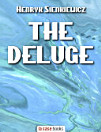Quo Vadis
Henryk Sienkiewicz
Nov 2022 · DigiCat
Ebook
563
Pages
family_home
Eligible
info
reportRatings and reviews aren’t verified Learn More
About this ebook
In "Quo Vadis," Henryk Sienkiewicz masterfully intertwines the historical and the personal, set against the backdrop of Nero's Rome during the first century A.D. The novel adopts a richly descriptive and evocative literary style, employing vivid imagery and poignant dialogue to capture the moral upheaval of early Christianity amid the decadence of Roman society. Sienkiewicz's narrative is laced with philosophical reflections on love, faith, and the struggle between good and evil, inviting readers to ponder the transformative power of belief in an age of turmoil. This seminal work not only paints an intricate portrait of ancient Rome but also highlights the timeless themes of human resilience and spiritual awakening, making it a cornerstone of historical fiction. Henryk Sienkiewicz, a Polish novelist and Nobel laureate, drew inspiration from his deep appreciation for his nation's history and cultural heritage, as well as his disdain for the oppression faced by Polish society during the partitions. His lifelong advocacy for Polish independence infuses "Quo Vadis" with a sense of urgency and moral clarity, revealing the author's belief in the potential of love and faith to inspire change in a corrupt world. A must-read for enthusiasts of historical fiction and lovers of literary craftsmanship, "Quo Vadis" offers a profound exploration of the human condition, making it an essential addition to any literary canon. By engaging with Sienkiewicz's exploration of humanity's eternal conflicts, readers will find not only an enchanting narrative but also an enduring message of hope and redemption.
About the author
Henryk Sienkiewicz (1846–1916) was an illustrious Polish novelist and a master of literary craft, whose work resonated with powerful themes of patriotism and historical identity. He was born in Wola Okrzejska, Poland, and over his lifetime, Sienkiewicz became not only a central figure of Polish literature but also a global literary sensation. Firmly rooted in the tradition of Romanticism, his narrative style conveyed a profound respect for the human spirit and a deep understanding of the complexities of human virtues and vices. His most famous novel, 'Quo Vadis: A Narrative of the Time of Nero' (1895), is a classic historical romance that engages with the period of early Christians in the Roman Empire, illuminating the brutal regime of Nero with a story that celebrates love, courage, and faith. This pivotal work earned him international fame and significantly contributed to him being awarded the Nobel Prize in Literature in 1905. 'Quo Vadis' has been translated into more than 50 languages and has inspired multiple film adaptations, testifying to its enduring universal appeal. Sienkiewicz's contribution extends beyond 'Quo Vadis'; his 'Trilogy'—comprising 'With Fire and Sword', 'The Deluge', and 'Fire in the Steppe'—is also a landmark in Polish literature, offering an epic portrayal of 17th-century Polish history that forged a collective cultural memory for his nation.
Rate this ebook
Tell us what you think.
Reading information
Smartphones and tablets
Install the Google Play Books app for Android and iPad/iPhone. It syncs automatically with your account and allows you to read online or offline wherever you are.
Laptops and computers
You can listen to audiobooks purchased on Google Play using your computer's web browser.
eReaders and other devices
To read on e-ink devices like Kobo eReaders, you'll need to download a file and transfer it to your device. Follow the detailed Help Center instructions to transfer the files to supported eReaders.








